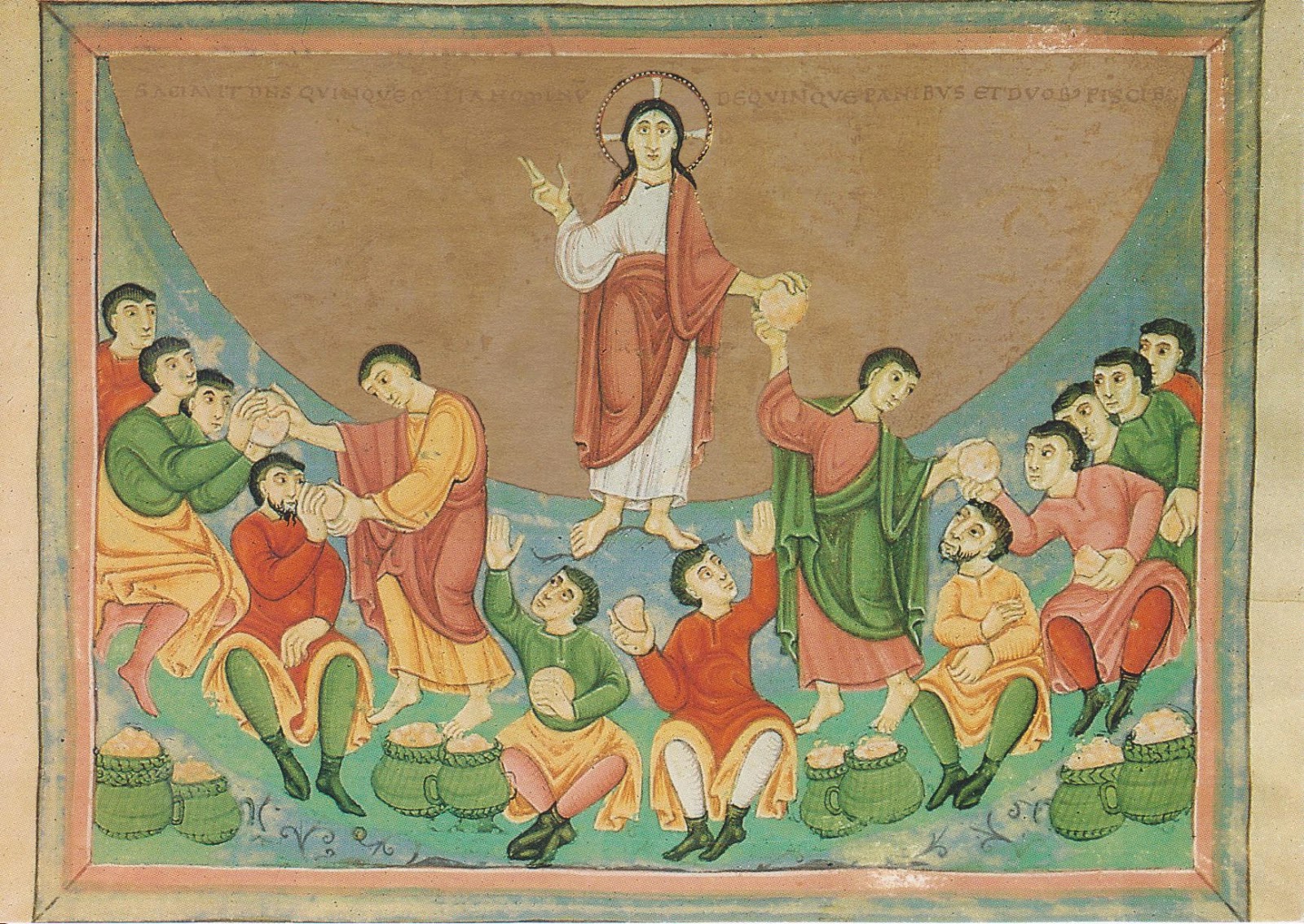2nd Passiontide
John 6: 26-35
Do not work for the food that
spoils, but create for yourselves the nourishment that leads to imperishable
life, which the Son of Man will give you because he is totally permeated by the
being of the Father God [upon him the Father has set his seal].
Thereafter they said to him, “What must we do in
order to learn to do deeds which endure [that our deeds may work with the
working of God]?
Jesus answered, “The working of God is [already in]
this: that in your whole being there begins to stir trust in him whom he has
sent.”
And they asked further, “What sign of the spirit
can you perform in order that we see and therefore come to trust in you? What
effect do your deeds have in the present time? Our fathers ate manna in the
desert, as it says in scripture: ‘Bread from the heavens he gave them to eat.’”
 |
| Egbert Codex |
Jesus said to them, “The truth I say to you, it was
not Moses who gave to you bread from the heavens, but it is my Father who gives
you the true bread from the heavens. The bread from the world of the spirit is
he who descends to you from the heavens; he gives himself as the true, unceasing
life of the world.”
Then they said, “Lord, give us this bread always.”
Jesus said to them, “I AM the bread of life. He who
finds the way to me will hunger no more, and he who comes to me in faith and
trust will nevermore thirst.
And they asked further, “By what sign that you do
shall we be able to see your essential nature and therefore come to trust in
you? What is your working? Our fathers ate manna in the desert, as it says in
scripture:
'Bread from the heavens he gave them to eat'.”
Jesus said to them, “The truth I say to you, it was
not Moses who gave to you bread from the heavens, but it is my Father who gives
you the true bread from the heavens. The bread from the world of the spirit is
he who descends to you from the heavens; he gives himself as the true,
unceasing life of the world.”
Then they said, “Lord, give us this bread always.”
Jesus said to them, “I AM the bread of life. He who
finds the way to me will hunger no more, and he who comes to me in faith and
trust will nevermore thirst.
2nd
Passiontide
John
6: 26-35
 When
one has not eaten for a long time, one’s consciousness can become fuzzy and
faint. We feel perhaps like we are beginning to float away. In such a case,
food becomes the anchor that brings us back to earth again. Bread brings body
and soul together again; we experience food as medicine.
When
one has not eaten for a long time, one’s consciousness can become fuzzy and
faint. We feel perhaps like we are beginning to float away. In such a case,
food becomes the anchor that brings us back to earth again. Bread brings body
and soul together again; we experience food as medicine.
Something
similar can also occur from the opposite direction. The simplest, perhaps even
the smallest amount of bread, can become richly nourishing, provided we bring
our devoted attention to the act of eating. Candles, flowers, white table
linens, a treasured company of guests help focus and enrich our attention.
Nourishment comes from both the food itself, and from what we bring to its
ensouling.
In
the Act of Consecration of Man, these two elements come together with a
remarkable result. We provide the ritual setting, the candles and flowers and
linens, even the bread and wine. And to them we add the very best of our souls’
forces: our purest thoughts, the love of our hearts, a devoted will. Thus do
bread and wine become ensouled by our speaking our energies into them. Then we
offer these ensouled foods to the Guest and His Father on the other side of the
table. And they in turn add their life, the very essence of their being into
them. Bread of earth becomes bread of heaven, bread for the angels. And then it
is given back to us as the consecrated living essence of God, the food that
truly brings the body and soul of Man and God together, the food that is the
true medicine.
The
early mystic Ephraim of Syria said:
His holy body wholly
mixed
with our bodies, and
His pure
blood
poured generously out
to fill our veins, His
voice
now pulses in our ears,
and look!
His lighted vision
pools within our eyes.
All of Him
is mixed with all of
us—
compassionate
communion. And as
He loves His church His
body
utterly, so He gives
it more
than bread, more
even than bread from
heaven,
but gives His own, His
living
bread for her to eat.
….and we
rise strengthened,
comforted, luminous.[1]



.jpg)










